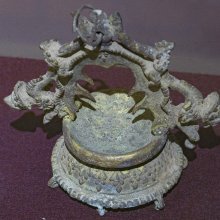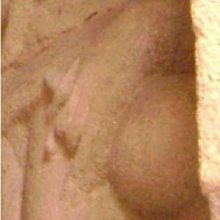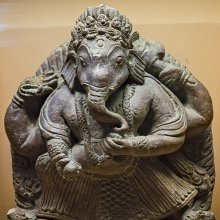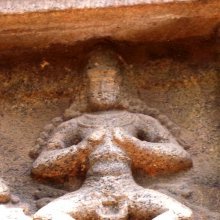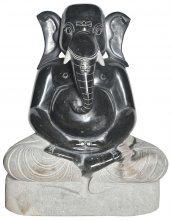Dip, Ḍip, Dīp: 10 definitions
Introduction:
Dip means something in Hinduism, Sanskrit, Hindi. If you want to know the exact meaning, history, etymology or English translation of this term then check out the descriptions on this page. Add your comment or reference to a book if you want to contribute to this summary article.
Images (photo gallery)
(+22 more images available)
Languages of India and abroad
Sanskrit dictionary
Source: DDSA: The practical Sanskrit-English dictionaryḌip (डिप्).—I. 1 Ā. To collect, heap together. -II. 4, 6, 1. P. (ḍipyati, ḍipati, ḍepayati)
1) To throw, cast, send.
2) To direct.
See also (synonyms): ḍiṃp.
--- OR ---
Dīp (दीप्).—4 Ā. (dīpyate, dīpta; frequent dedīpyate)
1) To shine, blaze, (fig. also); सर्वैरुस्रैः समग्रैस्त्वमिव नृपगुणैर्दीप्यते सप्तसप्तिः (sarvairusraiḥ samagraistvamiva nṛpaguṇairdīpyate saptasaptiḥ) M.2.12; तरुणीस्तन एव दीप्यते मणिहारावलिरामणीयकम् (taruṇīstana eva dīpyate maṇihārāvalirāmaṇīyakam) N.2. 44; Bhaṭṭikāvya 2.2; R.14.64; H. Pr.46.
2) To burn, be lighted; सोऽयमग्निः परेण मृत्युमतिक्रान्तो दीप्यते (so'yamagniḥ pareṇa mṛtyumatikrānto dīpyate) Bṛ. Up.1.3.12. यथा यथा चेयं चपला दीप्यते (yathā yathā ceyaṃ capalā dīpyate) K.15.
3) To glow, be inflamed or excited, increase (fig. also); वन्येतरानेकप- दर्शनेन पुनर्दिदीपे मददुर्दिनश्रीः (vanyetarānekapa- darśanena punardidīpe madadurdinaśrīḥ) R.5.47; Bhaṭṭikāvya 15.88; Śiśupālavadha 2.71.
4) To be fired with anger; आसाद्य वाचं स भृशं दिदीपे (āsādya vācaṃ sa bhṛśaṃ didīpe) Kirātārjunīya 3.55.
5) To be illustrious. -Caus. (dīpayati-te)
1) To kindle, set on fire, inflame; अयं हि मां दीपयतेऽद्य वह्निः (ayaṃ hi māṃ dīpayate'dya vahniḥ) Rām.2.43.21.
2) To illuminate, light, irradiate; वृन्दावनान्तरमदीपयदंशुजालैः (vṛndāvanāntaramadīpayadaṃśujālaiḥ) (induḥ) Gītagovinda 7; Uttararāmacarita 1.42.
3) To excite, raise.
4) To adorn, grace; अवयवदीपितमण्डन- श्रियस्ताः (avayavadīpitamaṇḍana- śriyastāḥ) Kirātārjunīya 1.1.
Source: Cologne Digital Sanskrit Dictionaries: Shabda-Sagara Sanskrit-English DictionaryḌip (डिप्).—[ḍipa] r. 4th cl. (ira) ḍipira (ḍipyati) r. 6th cl. (ḍipati) and r. 10th cl. (ḍepayati-te) To throw, to cast, to send or order, to direct preraṇe vā curā-ubhapakṣe tudā kuṭā0 para-saka-seṭ . see ṭipa r. 10th cl. (ḍepayati-te) also (i) ḍipi r. 1st and 10th cls. (ḍimpati) and (ḍimpaya-ti-te) To collect, to heap to gether. saṃhatau vā curā ubha, pakṣe bhvā-ātma-aka-seṭ .
--- OR ---
Dīp (दीप्).—[dīpa] r. 4th cl. (ī ṛ) ṛdīpī (dīpyate) To shine, to blaze, to be luminous or light. divā0 ā0 aka0 seṭ .
Source: Cologne Digital Sanskrit Dictionaries: Benfey Sanskrit-English DictionaryḌip (डिप्).—ḍimp ḌImp, i, 10, [Ātmanepada.] To collect. ḍip ḌIp, i. 4; 6 and 10, [Parasmaipada.], and ḍimb ḌImb, i. 10, [Ātmanepada.] To cast.
--- OR ---
Dip (दिप्).—i. 1, [Parasmaipada.] To drop, v. r. of tip.
--- OR ---
Dīp (दीप्).— (originally a Causal of dī), i. 4, [Ātmanepada.] (in epic poetry also [Parasmaipada.], Mahābhārata 3, 13984). 1. To blaze, [Rāmāyaṇa] 5, 50, 5. 2. To shine, Mahābhārata 5, 7322. dīpta, 1. Blazing, [Bhagavadgītā, (ed. Schlegel.)] 11, 17. 2. Hot, [Mānavadharmaśāstra] 3, 133. 3. Radiant, Mahābhārata 5, 7040. 4. Illuminated by the sun, opposite to the sun, inauspicious, [Draupadīpramātha] 6, 3; [Harivaṃśa, (ed. Calc.)] 9702. 5. Clear, Mahābhārata 3, 16603. [Causal.] dīpaya, 1. To kindle, [Bhagavadgītā, (ed. Schlegel.)] 4, 27. 2. To excite, [Śiśupālavadha] 9, 42. 3. To illuminate, [Kirātārjunīya] 5, 2. 4. To make illustrious, Mahābhārata 5, 1069. Comp. ptcple. of the pf. pass. adīpita, Not illuminated, [Kirātārjunīya] 5, 48. Frequent. dedīpya ([Parasmaipada.], Mahābhārata 7, 8138), 1. To be all in flame, Mahābhārata 3, 15588. 2. To be very radiant, Mahābhārata 3, 2146.
— With the prep. ati ati, atidīpta (rather dīpta with ati), Blazing violently, [Rāmāyaṇa] 5, 50, 8.
— With abhi abhi, To shine towards, [Harivaṃśa, (ed. Calc.)] 7501.
— With ā ā, ādīpta, 1. Blazing, [Ṛtusaṃhāra] 6, 19. 2. Burning, Mahābhārata 15, 1081. [Causal.] To kindle, [Rāmāyaṇa] 2, 89, 16.
— With vyā vi-ā, [Causal.] To illuminate completely, Mahābhārata 7, 7296.
— With ud ud, [Causal.] 1. To kindle, [Harivaṃśa, (ed. Calc.)] 5521. 2. To excite, [Bhāgavata-Purāṇa, (ed. Burnouf.)] 8, 7, 11. 3. To illuminate, Mārk. P. 49, 11.
— With samud sam-ud, [Causal.] To inflame, [Rāmāyaṇa] 4, 26, 14.
— With upa upa, [Causal.] To kindle, set on fire, Mahābhārata 3, 10230; 1, 5828.
— With pari pari, 1. To boil up, Mahābhārata 12, 2036 ([Parasmaipada.]). 2. To be completely radiant, Mahābhārata 7, 2237.
— With pra pra, pradīpta, 1. Blazing, [Rāmāyaṇa] 1, 54, 22. 2. Kindled (as anger), Mahābhārata 3, 2374. 3. Shining, [Ṛtusaṃhāra] 1, 27. 4. Illuminated, [Vedāntasāra, (in my Chrestomathy.)] in
— With saṃpra sam-pra, saṃpradīpta, Blazing, [Rāmāyaṇa] 5, 52, 13. [Causal.] To kindle, Mahābhārata 7, 7237.
— With prati prati, pratidīpta, Flaming towards, [Harivaṃśa, (ed. Calc.)] 13155.
— With vi vi, To shine, Mahābhārata 7, 7322; vidīpta, Shining, Mahābhārata 12, 8332. [Causal.] 1. To illuminate, Mahābhārata 8, 1488. 2. To inflame, [Bhāgavata-Purāṇa, (ed. Burnouf.)] 9, 4, 46.
— With abhivi abhi-vi, [Causal.] To set on fire, Mahābhārata 14, 2033.
— With sam sam, To blaze, [Harivaṃśa, (ed. Calc.)] 3539; saṃdīpta, 1. Burnag, [Bhartṛhari, (ed. Bohlen.)] 3. 26. 2. Flaming, Mahābhārata 5, 7205. [Causal.] 1. To kindle, set on fire, [Pañcatantra] 97, 25; Mahābhārata 1, 8366. 2. To excite, Mahābhārata 5, 2801.
Source: Cologne Digital Sanskrit Dictionaries: Cappeller Sanskrit-English DictionaryDīp (दीप्).—dīpyate dīpyate (dīpyati), [participle] dīpta (q.v.) blaze, flame, shine, be brilliant (l.&[feminine]). [Causative] dīpayati, te kindle, inflame, illuminate; excite, raise. [Intensive] dedīpyate blaze brightly, be radiant. —ā [Causative] inflame, kindle. ud flame up, burn; [Causative] = [Simple] [Causative] upa [Causative] kindle, set fire to ([accusative]). pra flame forth. burn. [Causative] kindle, inflame, rouse. vi blaze, flame; [Causative] kindle, illuminate. sam flame; [Causative] inflame, excite. — Cf. atidīpta, ādīptapradīpta, sadīpta.
Source: Cologne Digital Sanskrit Dictionaries: Monier-Williams Sanskrit-English Dictionary1) Ḍip (डिप्):—ḍimp, ḍimbh [class] 10. [Ātmanepada] ḍepayate, ḍimp, ḍimbh, to heap together, [Dhātupāṭha xxxiii, 4] : [class] 4. 10. 6. [Parasmaipada] ḍipyati, ḍipati, depayati ([varia lectio] ṭep, [Vopadeva]) [Ātmanepada] ḍimbayate, to throw, [Dhātupāṭha]
2) Dip (दिप्):—[class] 1. [Ātmanepada] depate, [ib.] ([v.l.] tip).
3) Dīp (दीप्):—[class] 4. [Ātmanepada] dīpyate (dīpyate, [Taittirīya-brāhmaṇa], dīpyati, [Mahābhārata] [perfect tense] didīpe, [Raghuvaṃśa v, 47]; [future] dīpiṣyate, dīpitā; [Aorist] adīpi, adīpiṣṭa [infinitive mood] dīpitum, [Pāṇini 7-2, 8 [Scholiast or Commentator]; ; iii, 1, 61])
—to blaze, flare, shine, be luminous or illustrious, [Atharva-veda; Brāhmaṇa; Manu-smṛti; Mahābhārata; Kālidāsa] etc.;—glow, burn (also with anger, [Bhaṭṭi-kāvya]) :—[Causal] dīpayati, te [Aorist] adīdipat or adidīpat ([Pāṇini 7-4, 3]) to kindle, set on fire, inflame, [Tāṇḍya-brāhmaṇa xvi, 1; Āśvalāyana-gṛhya-sūtra iv, 6; Kauśika-sūtra 60 etc.];—illuminate, make illustrious, [Mahābhārata; Harivaṃśa] etc.;—excite, rouse, [ib.] :—[Desiderative] didīpiṣate:
—[Intensive] dedīpyate, to blaze fiercely, shine intensely, be very bright, [Mahābhārata; Bhāgavata-purāṇa];—p. dedīpyantī, [Mahābhārata vii, 8138.]
Source: Cologne Digital Sanskrit Dictionaries: Yates Sanskrit-English Dictionary1) Ḍip (डिप्):—(ya, śa, ka) ḍipyati, ḍipati, ḍepayati 4. 6. 10. a. To throw, send. (ki, i) ḍimpati, yati 1. 10. a. To collect.
2) Dīp (दीप्):—(ya, ī, ṛ) dīpyate 4. d. To shine, to blaze, to be luminous.
Source: DDSA: Paia-sadda-mahannavo; a comprehensive Prakrit Hindi dictionary (S)Dīp (दीप्) in the Sanskrit language is related to the Prakrit words: Ḍippa, Ḍiva, Ḍeva, Dippa, Dhippa.
[Sanskrit to German]
Sanskrit, also spelled संस्कृतम् (saṃskṛtam), is an ancient language of India commonly seen as the grandmother of the Indo-European language family (even English!). Closely allied with Prakrit and Pali, Sanskrit is more exhaustive in both grammar and terms and has the most extensive collection of literature in the world, greatly surpassing its sister-languages Greek and Latin.
Hindi dictionary
Source: DDSA: A practical Hindi-English dictionaryDip in Hindi refers in English to:—(nm) an earthen lamp; the most eminent person of a family or clan; ~[griha] a light-house; ~[dana] offering of a lamp to a deity for adoration; ~[mala/malika] a row of lamps; the [divali] festival; ~[varti/vartika] the wick of a lamp; ~[shikha] the flame of a lamp; ~[stambha] a lamp-post; —[se dipa jale] one lamp kindles another..—dip (दीप) is alternatively transliterated as Dīpa.
...
See also (Relevant definitions)
Starts with (+325): Dipa, Dipa Sutta, Dipa Vihara, Dipa-shule, Dipa-skambha, Dipabhajana, Dipaca Kavada, Dipacandi, Dipacci, Dipada, Dipadadhipati, Dipadana, Dipadanakarika, Dipadanapaddhati, Dipadanaratna, Dipadanavidhi, Dipadanda, Dipadarshana, Dipadhari, Dipadharini.
Ends with: Abhidip, Adip, Avadip, Idip, Komondip, Ok dip, Paridip, Pradip, Pratyuddip, Samdip, Sampradip, Samuddip, Sudip, Uddip, Upadip, Vidip, Vyadip.
Full-text (+2267): Gambhira, Agadha, Dimbh, Agadhajala, Dipa, Mandra, Sushupti, Dipti, Gota, Nica, Doba, Nimna, Dimp, Dubaki, Bucakalanem, Doha, Atalasparsha, Gabhira, Uddipra, Avagadha.
Relevant text
Search found 436 books and stories containing Dip, Ḍip, Dīp, Deep; (plurals include: Dips, Ḍips, Dīps, Deeps). You can also click to the full overview containing English textual excerpts. Below are direct links for the most relevant articles:
The Brahma Purana (by G. P. Bhatt)
Chapter 54 - Visit to Kṛṣṇa Shrine
Chapter 62 - Holy Ablution in Propitiation of Kṛṣṇa
Face of a Problem < [January - March 1973]
Ode to a Pen < [April – June, 2006]
India and world Literature < [October 1987 – March 1989]
Jainism in Odisha (Orissa) (by Ashis Ranjan Sahoo)
Archaeological importance of Nasik, Jagatsinghpur < [Chapter 3: Survey of Jaina Antiquities in Odisha]
Archaeological importance of Kundeswar, Jagatsinghpur < [Chapter 3: Survey of Jaina Antiquities in Odisha]
Archaeological importance of Manapur-Gadhama, Jagatsinghpur < [Chapter 3: Survey of Jaina Antiquities in Odisha]
Rasa Jala Nidhi, vol 5: Treatment of various afflictions (by Bhudeb Mookerjee)
Chapter 19 - Symptoms and Treatment of Daha (sensation of heat)
Chapter 21 - Symptoms and Treatment of Murcha (loss of consciousness)
Chapter 2 - Symptoms and treatment of Rajayakshma (Phthisis or consumption)
Sushruta Samhita, Volume 6: Uttara-tantra (by Kaviraj Kunja Lal Bhishagratna)
Chapter V - Pathology of the diseases of the black part of the eye < [Canto I - Shalakya-tantra (ears, eyes, nose, mouth and throat)]
Chapter XXVII - Specific features of nine malignant Grahas < [Canto II - Kaumarabhritya-tantra (pediatrics, gynecology and pregnancy)]
Chapter LXVI - The different Modifications of the different Doshas < [Canto V - Tantra-bhusana-adhyaya (embellishing chapters)]
Jnaneshwari (Bhavartha Dipika) (by Ramchandra Keshav Bhagwat)
Commentary introduction to Chapter 9 < [Chapter 9 - Raja-vidya and Raja-guhya Yoga]
Commentary introduction to Chapter 11 < [Chapter 11 - Vishvarupa-darshana-yoga]
Verse 11.35 < [Chapter 11 - Vishvarupa-darshana-yoga]
Related products
(+132 more products available)
